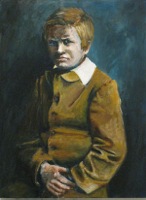Difference between revisions of "Petulant"
From Nordan Symposia
Jump to navigationJump to search (Created page with 'File:lighterstill.jpgright|frame ==Origin== Latin or Middle French; Middle French, from Latin ''petulant''-, ''petulans''; akin to Latin ''petere''...') |
m (Text replacement - "http://" to "https://") |
||
| Line 3: | Line 3: | ||
==Origin== | ==Origin== | ||
[[Latin]] or Middle French; Middle French, from Latin ''petulant''-, ''petulans''; akin to Latin ''petere'' to go to, [[attack]], seek | [[Latin]] or Middle French; Middle French, from Latin ''petulant''-, ''petulans''; akin to Latin ''petere'' to go to, [[attack]], seek | ||
| − | *[ | + | *[https://en.wikipedia.org/wiki/16th_century 1598] |
==Definitions== | ==Definitions== | ||
*1: insolent or rude in [[speech]] or [[behavior]] | *1: insolent or rude in [[speech]] or [[behavior]] | ||
Latest revision as of 02:32, 13 December 2020
Origin
Latin or Middle French; Middle French, from Latin petulant-, petulans; akin to Latin petere to go to, attack, seek
Definitions
- 1: insolent or rude in speech or behavior
- 2: characterized by temporary or capricious ill humor : peevish meaning "ornery or ill-tempered."
Annoyance
Annoyance is an unpleasant mental state that is characterized by such effects as irritation and distraction from one's conscious thinking. It can lead to emotions such as frustration and anger. The property of being easily annoyed is called irritability.
A pet peeve (or pet hate) is a minor annoyance that an individual identifies as particularly annoying to them, to a greater degree than others may find it.
